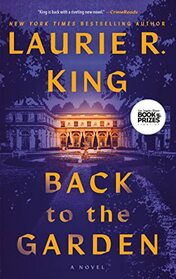I did not care for the dual timeline much, especially at first. I got used to it, but for the first third I really didn't care about the minutiae of life on the commune, I wanted to know more about Laing's investigation. And then it sort of clicked why King did it that way, and I knew the identity of the victim and the murderer. I don't know if King intended readers to pick up on the clues that early, but there really wasn't much suspense after that. Oddly enough I didn't feel it slowed it down more. I liked Laing - I've seen comments that she's much like King's earlier protagonist Kate Martinelli, but I don't remember that series very well so I can't say. I did think she was too cliche - maverick wounded cop with an almost superhuman skill, sidekick internet hacker person, older wise mentor, etc. But all in all, it did keep me reading. I'm giving it a solid B. Looks like the start of another series and I'd read the next.
After reading Back to the Garden, I was disappointed to see that it was listed as a standalone thriller. Then I read author Laurie R. King's blog and learned that it's the first in a new series featuring Raquel Laing. My initial disappointment turned to happiness. Raquel Laing is just too good a character for one book; readers deserve to see more of this maverick police officer who walks with a cane and is a whiz at reading people's facial expressions. Laing is the type of police officer who believes in responsibility over compliance: if something is the right thing to do, she's going to do it rather than obey some pencil pusher's request to cater to the rich and shameless-- even though she knows she may lose her job. Now... that's my kind of character.
Just as much as I enjoyed Laing's character, I also loved the setting. Back to the Garden switches back and forth between the present day and the 1970s when Rob Gardener turned the estate into a commune. Even if you're not old enough to remember the 1970s, the setting will come to life as Laing interviews people and reads the documents that Mrs. Dalhousie finds for her. This book is an excellent "whose body?" and "whodunit?" that kept me wondering and guessing from beginning to end.
Many writers of long-running series need a break from those characters, and I am so glad that Laurie R. King has decided to introduce us to Raquel Laing. If you've read and enjoyed Michael Connelly's Renée Ballard mysteries, you really need to meet Raquel Laing. Bring on Raquel's next investigation!
(Review copy courtesy of the publisher and Net Galley)
Just as much as I enjoyed Laing's character, I also loved the setting. Back to the Garden switches back and forth between the present day and the 1970s when Rob Gardener turned the estate into a commune. Even if you're not old enough to remember the 1970s, the setting will come to life as Laing interviews people and reads the documents that Mrs. Dalhousie finds for her. This book is an excellent "whose body?" and "whodunit?" that kept me wondering and guessing from beginning to end.
Many writers of long-running series need a break from those characters, and I am so glad that Laurie R. King has decided to introduce us to Raquel Laing. If you've read and enjoyed Michael Connelly's Renée Ballard mysteries, you really need to meet Raquel Laing. Bring on Raquel's next investigation!
(Review copy courtesy of the publisher and Net Galley)
The blurb for Back to the Garden by Laurie R. King had me intrigued. I was looking forward to reading this police procedural (it is not a cozy mystery). The book involves an investigation into a cold case, but our investigator is also trying to identify victims of another serial killer before it is too late. The story goes back and forth between the past (in the 70s) and the present. I had trouble with the author's writing style. She is a descriptive writer which makes the story move slowly. We are introduced to a number of characters. I found Inspector Raquel Laing overshadowed by some of the other characters. Raquel needed more development plus she was boring. The chapters focusing on The Highwayman case were monotonous (they were helpful for my insomnia). I discerned that Raquel is disabled (we are told she uses a cane often enough), she is a lesbian (cue the love interest), she can read micro-expressions (be prepared for mind-numbing details), and she has no qualms about breaking the rules (of course). I did not find her to be a likeable character. There were some characters that were not needed (like the woman who blushed all the time). The 1970s timeline was developed. The author certainly captured the time period and the feel of the era. The mystery was well-done, but it a cinch to solve (before I was a tenth of the way through the book). The mystery is resolved at the end. The ending, though, was abrupt which did not go with the rest of the book (and it felt like it took me years to get to the end). The pacing is agonizingly slow. It does pick up towards the end of the book. The story needed action, suspense, and fewer pages. The story does contain an extensive amount of foul language and crude language (which I found offensive). I struggled to get through Back to the Garden. It is just my type of story. I encourage you to obtain a sample to judge for yourself. Back to the Garden is a police procedural with an extensive estate, strange statues, a dreadful discovery, and a dogged detective.




